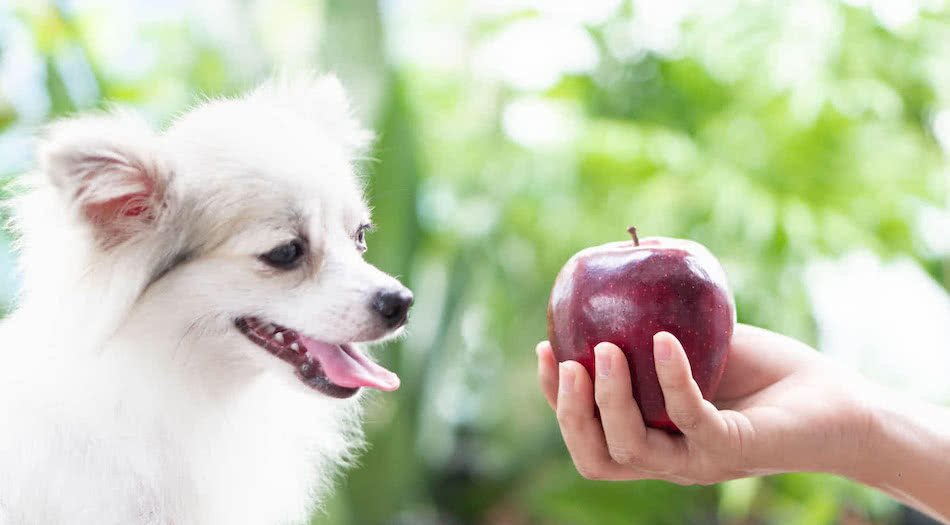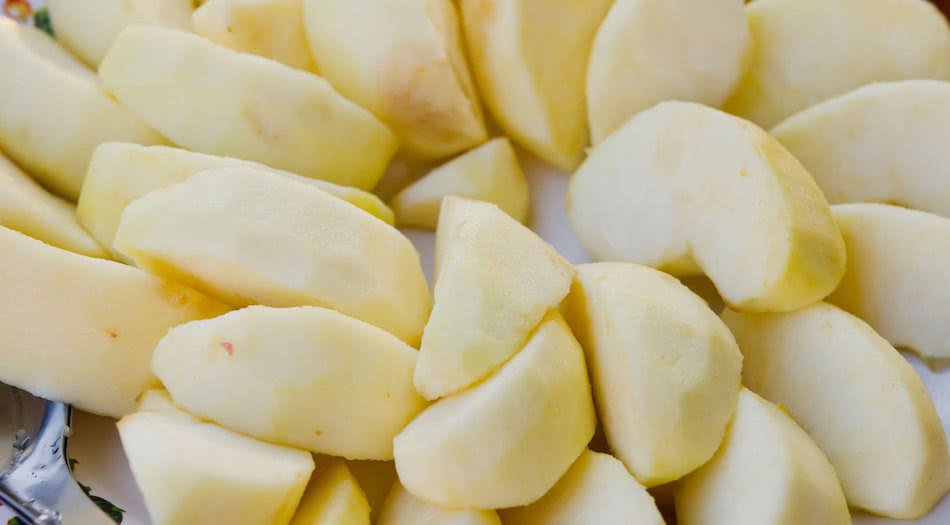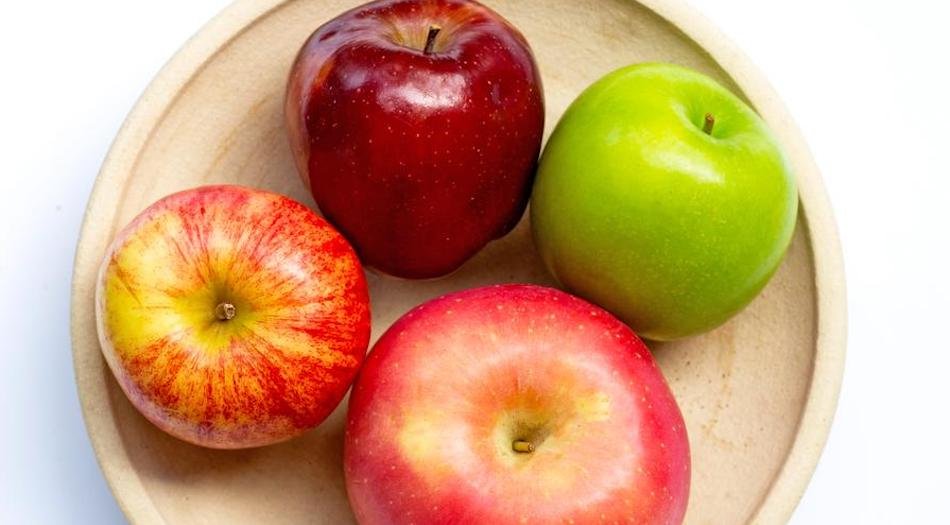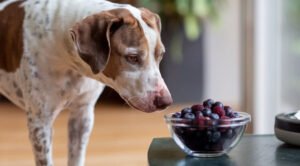Alright, dog lovers, let’s chat about a question we’ve all pondered: can dogs eat apples? The answer is a resounding yes, dogs can eat apples and those crunchy, sweet treats can be a healthy addition to your pup’s diet. But moderation is key and apples should be prepared properly, so read on to get the details.

Before introducing any new foods to your dog’s diet, always consult your vet. Individual dogs may have different intolerances, dietary needs, and health considerations. This article is not a substitute for professional veterinary advice.
Benefits of Apples for Dogs
Apples really are a tail-wagging treat for our canine companions. Bursting with vitamin C which can boost to your pup’s immune system, and packed with fiber which helps in keeping your dog’s digestive system running smoothly, eating apples is a great source of nutrients for your dog as a healthy occasional treat. Benefits that apples can offer include:
- Antioxidants
- Vitamin C
- Vitamin A
- Vitamins B
- Potassium
- Fiber
- Low Calorie
- Digestive system support
- Boost immune system
- Energy and metabolism
- Eye and skin health
- Crunchy teeth clean
Navigating the Risks
Beware of Apple Cores & Seeds
While apples can make a woof-worthy snack for your dog, it’s essential to talk about the details that call for a dose of caution.
The apple core has a hard, tough texture. For smaller dogs especially they may pose a choking hazard, so it’s best to cut them out before you share apple with your dog.
Beware that the seeds a no-no too. They contain a compound that can release cyanide when digested, and we don’t want that for our precious pups. Sure, it’s in small amounts, and a dog indulging in a few seeds might not immediately land in trouble, but we’re all about playing it safe and it’s still something we’d rather keep away from our pups. So, let’s make it a habit to remove them so snack time remains a joyous occasion, free from worry.
Sugar Content in Apples
We all love a sweet snack now and then, and apples are no exception, but for dogs with certain health conditions like diabetes or weight concerns, their natural sugar content is worth paying attention to. While an occasional slice or two is perfectly fine for most dogs, be cautious with pups who need to watch their sugar intake. Always opt for moderation to ensure you’re treating your dog without going overboard. If your dog has a sweet tooth, chat with your vet to make sure apples fit into their dietary needs safely.
How Apples Affect Dogs with Specific Health Conditions
If your pup has specific health issues, like pancreatitis or allergies, you might want to take a closer look at how apples affect them. Apples are high in fiber and low in fat, making them a potential tummy-soother for constipated dogs. However, for dogs with diabetes or pancreatitis, the sugar and fiber content may cause discomfort or other issues. Always consult with your vet before offering apples to a dog with any ongoing health conditions to make sure this tasty treat fits into their wellness plan.
Potential Impact on Dental Health
Chewing on apple slices does more than just satisfy your dog’s taste buds—it can also help clean their teeth! The crunchy texture can naturally scrape off plaque and promote dental health. However, keep in mind that apples do contain natural sugars, so be careful not to overdo it. Regular brushing is still the best way to keep your dog’s teeth shiny and healthy, but apples can be a tasty little helper.
Apple Allergy Symptoms in Dogs
Most dogs will happily munch on apples without any issues, but on rare occasions, some dogs might be allergic. If you notice any signs like itching, swelling, or digestive upset after your dog eats an apple, it could be an allergy. Symptoms of an allergic reaction can vary, but if your dog seems uncomfortable after trying apples, it’s best to stop feeding them this fruit and talk to your vet to rule out any allergies.
Make Apples Dog-Friendly and Delicious
Turning the humble apple into a dog friendly delicacy couldn’t be simpler. Pick a crisp green apple, wash it thoroughly to get rid of dirt and chemicals. Then slice it into bite-sized pieces, making sure to remove all the seeds and core – the hidden hazards we chatted about that aren’t good for your pup. And that’s it.
Apple Varieties and Their Impact on Dogs
When picking apples for your pooch, you might be wondering if one variety is better than another. Green apples are known for their tangy flavor and firm texture, while red apples are sweeter and softer. Both are safe for dogs, but the choice really comes down to your pet’s preferences. Does your dog enjoy a tart, crisp crunch or a softer, sweet bite? Either way, as long as you’ve removed the seeds and core, you’re all set to serve up a dog-friendly apple snack!
How Much Apple Can A Dog Eat?
Dogs are just like us, where too much of a good thing can lead to a bellyache. So, balance the love for treats with a sensible approach. A slice or two as an occasional delight? Absolutely. But an apple a day is a human’s way, not a pup’s. Sharing apple should be more of a special bonding moment rather than a daily habit. Just keep those treats scarce, relish the moments, and your dog will thank you for it.
FAQs?
Can Dogs Eat Apple Peel?
You’ve seen how much your pup’s eyes light up at the sight of treats, and if you’ve decided that apples may safely make the menu, you may be pondering whether to peel or not to peel. The skin of an apple is a fountain of fiber and vitamins, beneficial not just for us but also for our furry friends.
For older dogs or those with digestive issues, peeling the skin might make this snack easier to digest. However, the skin is generally fine for most dogs to consume.
If you’re worried about pesticides, a good wash or opting for organic apples for your dog should put your mind at ease.

Can Dogs Eat Cooked Apples?
Apples aren’t just great raw—they can be enjoyed cooked, too! If you want to offer your dog something a little different, try lightly steaming or baking some apple slices (without sugar or spices). Cooking apples makes them softer and easier to digest, which is especially helpful for older dogs or those with sensitive stomachs. Just make sure they’re plain, without any added ingredients that could upset your dog’s tummy.
Can Dogs Eat Green Apples and Red Apples?
If you find yourself in the fruit aisle, debating whether green apples or red apples are the better pick for your pet, you’re not alone. Both can be delightful treats for your dog. Green apples tend to be a bit tangier, and often a bit harder in texture too, especially if they are greener for being slightly less ripe (but not unripe). Red apples are typically sweeter and softer in texture, giving your pooch variety in their treats. When picking the right one, consider your pet’s palatal preferences; some dogs may find the tartness of green apples more exciting, others might lean toward the mellow softness of red apples.

Can Dogs Eat Crab Apples?
Crab apples tend to be much more acidic than regular apples, and the higher acidity can irritate your dog’s stomach, potentially causing vomiting or diarrhea. If you’re out for a walk and spot crab apples on the ground, it’s best to steer your dog away to keep their stomach happy.
Can Dogs Eat Apple Pie?
Apple pie may be delicious but it has all sorts of ingredients that dogs should not have, including sugar and fats. So it’s not the food to feeding Fido, no matter how hard he tries to convince you with his imploring puppy eyes.
Can Dogs Eat Applesauce?
For a softer treat, applesauce can be a delight – just be sure it’s unsweetened and doesn’t contain any artificial sweeteners or additives that might be harmful to dogs. It couldn’t be easier to make yourself – put thinly chopped apples in a saucepan with a few drops of water and cook on low heat until the apple is soft and mushy.
Can Dogs Eat Dried Apples?
Have you ever wondered if dried apples are suitable for your pup? They generally can be a yummy snack for your dog. However dried apples may sometimes have additional sugars and additives so look out for those on the ingredients labels. Make sure they are natural, ideally organic and free from any unwanted sugars or spices to be dog-friendly. Ensuring your dog doesn’t gobble down too many is also key, as the concentrated sweetness can upset their tummy.
Can Puppies Eat Apples?
Ah, embarking on the apple adventure with your puppy! Imagine your little pup’s eyes lighting up at the first sniff of that fresh, juicy apple. But this journey needs a sprinkle of caution. Before slicing into that rosy apple, have a chat with your vet, just to be on the safe side, especially if your furry bundle has a sensitive tummy or special dietary needs. Puppies have more delicate digestive systems and caution should be taken. If you’ve got a yes from the vet, that your puppy can eat apple offer your pup a tiny piece, just enough to tantalize those puppy taste buds. You don’t want a tummy upset on your hands. And of course be careful not to give any of the core or seeds, as we’ve talked about earlier. Steer clear of any processed apple products too – puppies don’t need those extra sugars and spices.

My Dog Ate an Apple Core, What Should I Do?
We know a juicy apple can be a delightful snack for your dog. If your dog has sneakily snatched an apple and eaten it core and all, it’s probably not a reason for alarm. It’s unlikely to land them in trouble if it happens once and they have no other health issues or allergies. Keep an eye on your dog and if you’re at all worried, always consult a vet. And consider it a crunchy lesson learned to ensure the treat is fully dog-friendly so your dog can enjoy a trouble-free treat.
Can Dogs have Apple Cider Vinegar?
While some dog lovers sing praises about apple cider vinegar for its claimed health benefits, including improved digestion and allergy relief, others raise eyebrows at its potential acidity for our pets. Implementing a new element like apple cider vinegar into your pet’s diet should be approached with care – always in moderation, and always after a vet’s guidance for your particular dog’s needs.
Do Apples Help Freshen Dog’s Breath?
Does your dog have some stinky breath? Apples might help! The natural crunch of apples can help clean your dog’s teeth and freshen their breath at the same time. While it’s no replacement for a good brushing routine, feeding your dog a slice of apple after meals can help combat that doggie breath and leave them smelling a little fresher.
The Verdict… Can Dogs Eat Apples?
Dogs can eat apples and these crunchy morsels could be a delightful addition to your pup’s diet. Apples are a tasty and nutritious snack for dogs, promoting health and happiness with their bounty of vitamins and nutrients. But before you let them eat, eat, eat away, be wary of the seeds and core. Prep the apple and mind the amount they eat – finding that sweet spot for your beloved pet is key.





